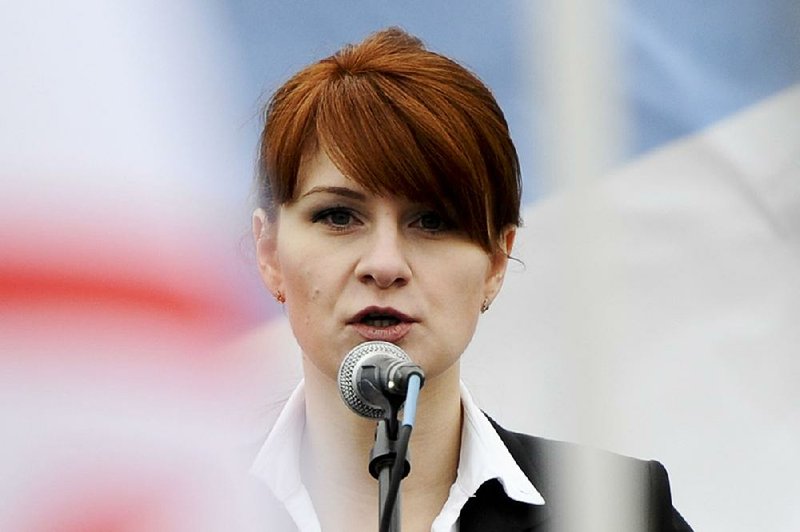Maria Butina, a Russian gun-rights activist, is poised to plead guilty in a case involving accusations that she was working as an agent for the Kremlin in the United States, according to a new court filing.
Attorneys for Butina and federal prosecutors jointly requested in court documents Monday that U.S. District Judge Tanya Chutkan set a time for Butina to withdraw her previous innocent plea.
The parties have resolved this matter," Butina's attorneys and D.C.-based prosecutors wrote in their joint filing.
Chutkan said she would hear the matter Wednesday.
A plea is not final until it is entered in court and accepted by a judge. Monday's filing did not indicate to what charge she is set to plead.
Butina was charged with conspiracy and acting as an unregistered foreign agent for Russia.
She was accused of working to push the Kremlin's agenda by forming bonds with National Rifle Association officials and other conservative leaders and reaching out to 2016 presidential candidates.
A native of Siberia, she founded a group to expand gun rights in Russia, a profile that allowed her to develop relationships with U.S. conservatives intrigued with her work. Prosecutors said Butina, 30, stepped up her activities after moving to Washington in September 2016 to attend graduate school at American University.
Her lawyers had said her interactions with the NRA and others were typical of an ambitious student anxious to network and eager to build better relations between the U.S. and her country. They had at one point argued her outreach should be covered by constitutional protections for free speech and noted that she was not accused of attempting to steal U.S. secrets or working with Russian intelligence.
But prosecutors said her goal was to advance the foreign policy aims of the Kremlin and that she was acting at the direction of a Russian government official, Alexander Torshin, a former senator who now serves as deputy director of the Russian central bank and who was sanctioned by the U.S. Treasury Department for his alleged ties to Russian President Vladimir Putin.
Butina has been jailed four months since her July arrest. In that time, her case had been embraced by the Russian government, which had vigorously protested that her incarceration was unjust.
Butina was prosecuted by the U.S. attorney's office in Washington, rather than special counsel Robert Mueller -- an indication that Mueller may have determined that her activities did not directly connect to his investigation, which involves scrutinizing any links between Russia and President Donald Trump's campaign.
Still, Butina intersected with Trump's campaign several times before the 2016 election. In June 2015, she authored a column for an American magazine in which she argued that only the election of a Republican president would result in better ties between the U.S. and Russia. A month later, at a public town hall event in Las Vegas, she was able to ask a question directly to Trump, inquiring about how he viewed sanctions imposed on Russia after its 2014 invasion of Crimea.
"We get along with Putin," he told Butina. "I don't think you'd need the sanctions."
Butina was then involved with an unsuccessful effort to organize a meeting between Torshin and Trump at an NRA convention in May 2016. Instead, she and Torshin briefly interacted with Donald Trump Jr., the president's son, at the event, according to documents turned over to Congress.
In September 2016, she sought out J.D. Gordon, who had served as a national security adviser to Trump's campaign and then was given an advisory position on Trump's transition committee. Emails show the two attended a concert by the rock band Styx and that Butina attended a birthday party for Gordon in October 2016.
Gordon has said the contacts were innocuous and ended after the party.
Butina's efforts to network with U.S. conservatives coincided with what the U.S. intelligence committee has said was an elaborate effort by the Russian government to interfere with the American electoral system and help elect Trump over Democrat Hillary Clinton.
Information for this article was contributed by Michael Balsamo of The Associated Press.
A Section on 12/11/2018
